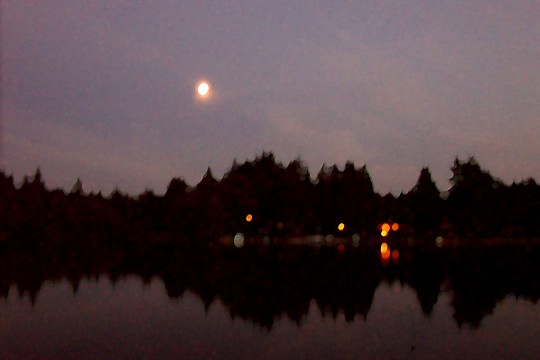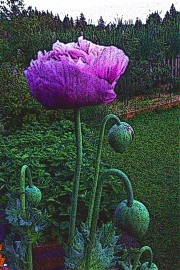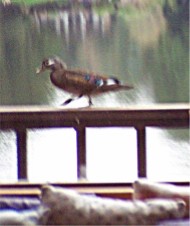Life at the Lake
a diary of living at a small lowland lakeWHAT IT'S LIKE

Early moonrise over Lake Ketchum
|
Archive Search |
| Links |
|
and s-integrator |
POPPIES, ANYONE?

Big lavender poppy (digitally edited) in the front yard
310
We have three kinds of poppies in the yard facing the lake, the small orange California weed, the big red ornamental poppy, and this huge, strangely colored lavender poppy that has just come into bloom, and looks slightly different from this digitally altered photo of mine.
At first I saw it towering next to the chard and thought it a weed. Then it showed these huge buds (lower stem); the buds I thought were seed pods, and I meditated briefly on trying to make my own heroin, but didn't want to damaged the fragile economy of Afghanistan any further as a meddling American, so decided against it. But then (mirabile dictu!) it opened into a sexy delicate bloom, huge and reminiscent of a Georgia O'Keeffe painting.
And then there was another, and another. The longer they are around, the paler and more fragile they become, and after a few days begin to shed large petals to the ground. Rain strikes the petals and they start to dissolve, and soon the ground beneath the poppy looks like wet newsprint.
Meanwhile the genuine seed pod is forming and thoughts of manufacturing my own drug from it return. Where can I get a how-to book? From the library?
"May I help you?"
"Yeah, do you have any books on home heroin manufacture?"
(Shriek, flee.)
- - Comments ()
...
CANADA GEESE BROODS?

A pair, sure, but usually they are more
309
The sight of a new brood of Canada geese warms my heart. If only we humans showed such devotion and concern to our own!
This morning, streaming across the lake, a flotilla of Canadas, young and old, in tight, protective formation (though they are huge and there is no visible threat). Tightly clustered, if I were a mathematician, I'd express the arrangement of adults and juveniles thusly:
A,J,J,J,A,J,J,J,A
Now, two of the adults could be their parents, but . . . three? The extended family of geese (they don't even have to be aunts and uncles, grandmothers and grandfathers) is impressive and awesome.
At least it is to me.
- - Comments ()
...
WOODIES, ANYONE?

Female wood duck from earlier in the year, sans ducklings
307
My theory was that the wood ducks were molting, that is, losing their flight feathers, and could not fly. When I walked out on my dock for a late-night bit of flycasting to smutting trout, there often was a matched pair of woodies on the edge of the lake, but they would not fly off, as they always did of old, but swam swiftly away, the hen protesting audibly in a squeak/squawk.
Today the dogs sat pointed out the lower screen door, very attentive. So my eyes followed their eyes. A female with eleven (rough, quick count) ducklings, all fuzzy and round, and in tight protective formation, followed her lead, almost as one. I called out to Norma to come see. And she caught the sight as they disappeared into the sedges.
Perhaps my original theory was right, then. The wood ducks are molted, and what better time to be unable to fly than when they have a defenseless brood nearly under-wing.
They couldn't possibly abandon them to fly away for self-protection. No, that isn't what this breeding game is all about.
- - Comments ()
...